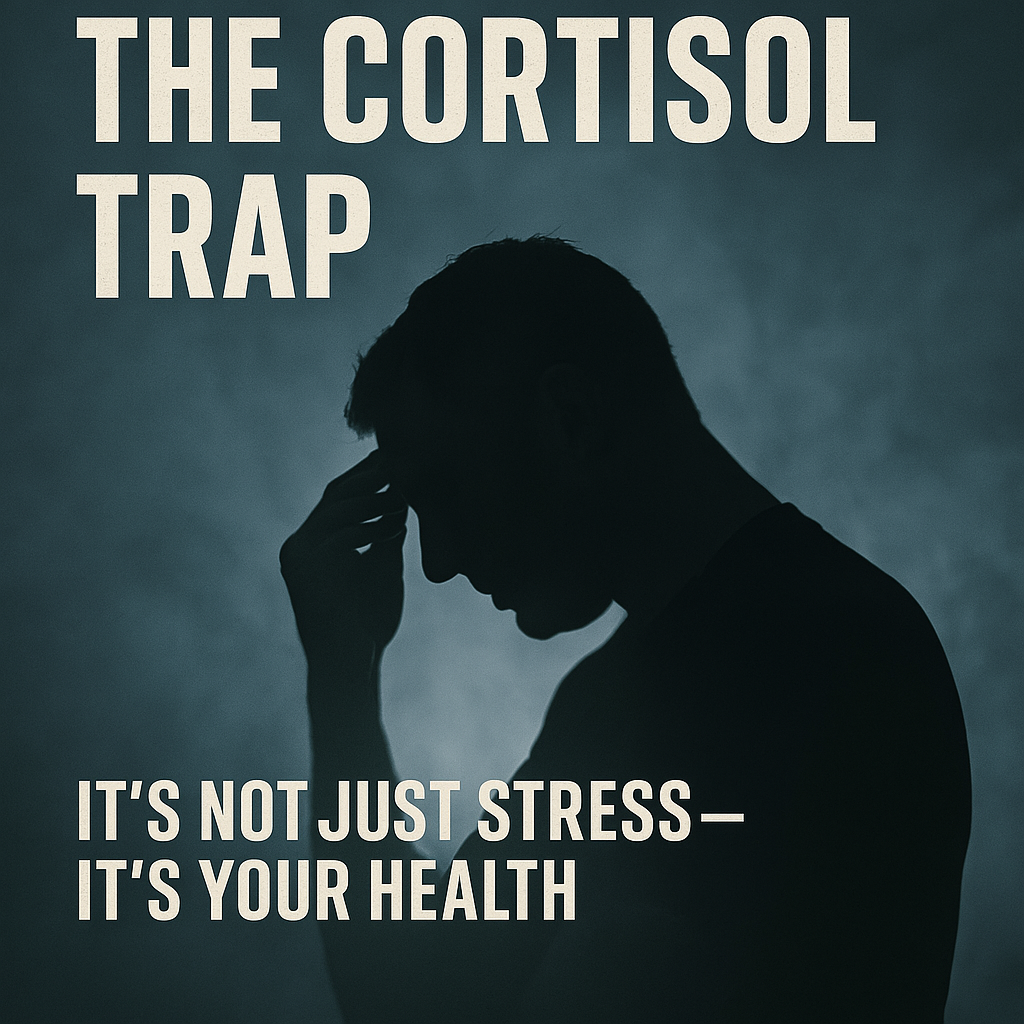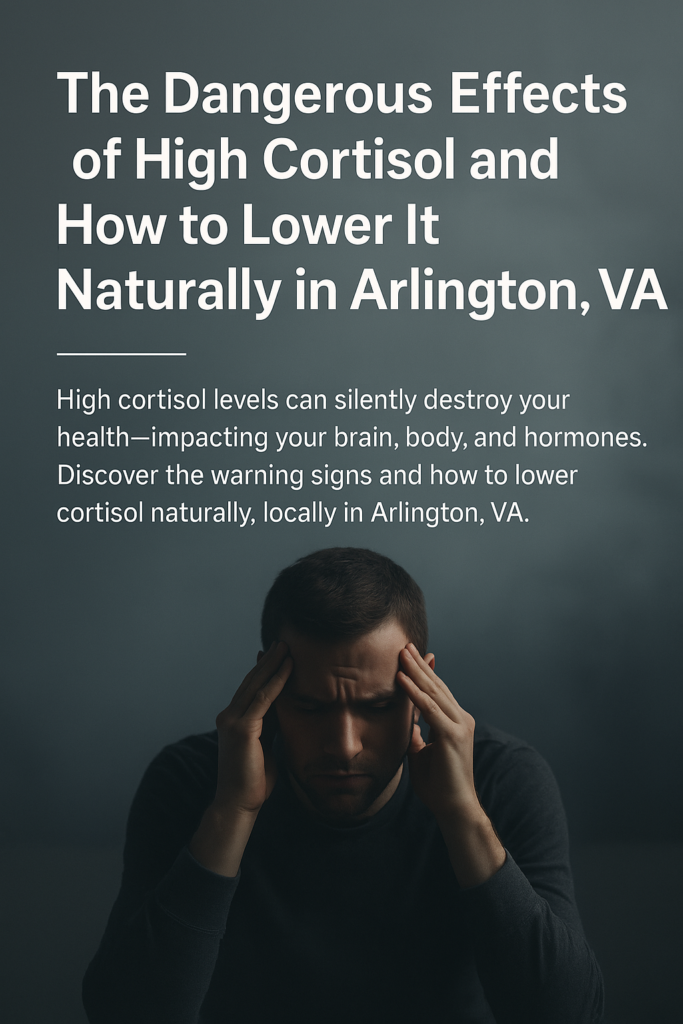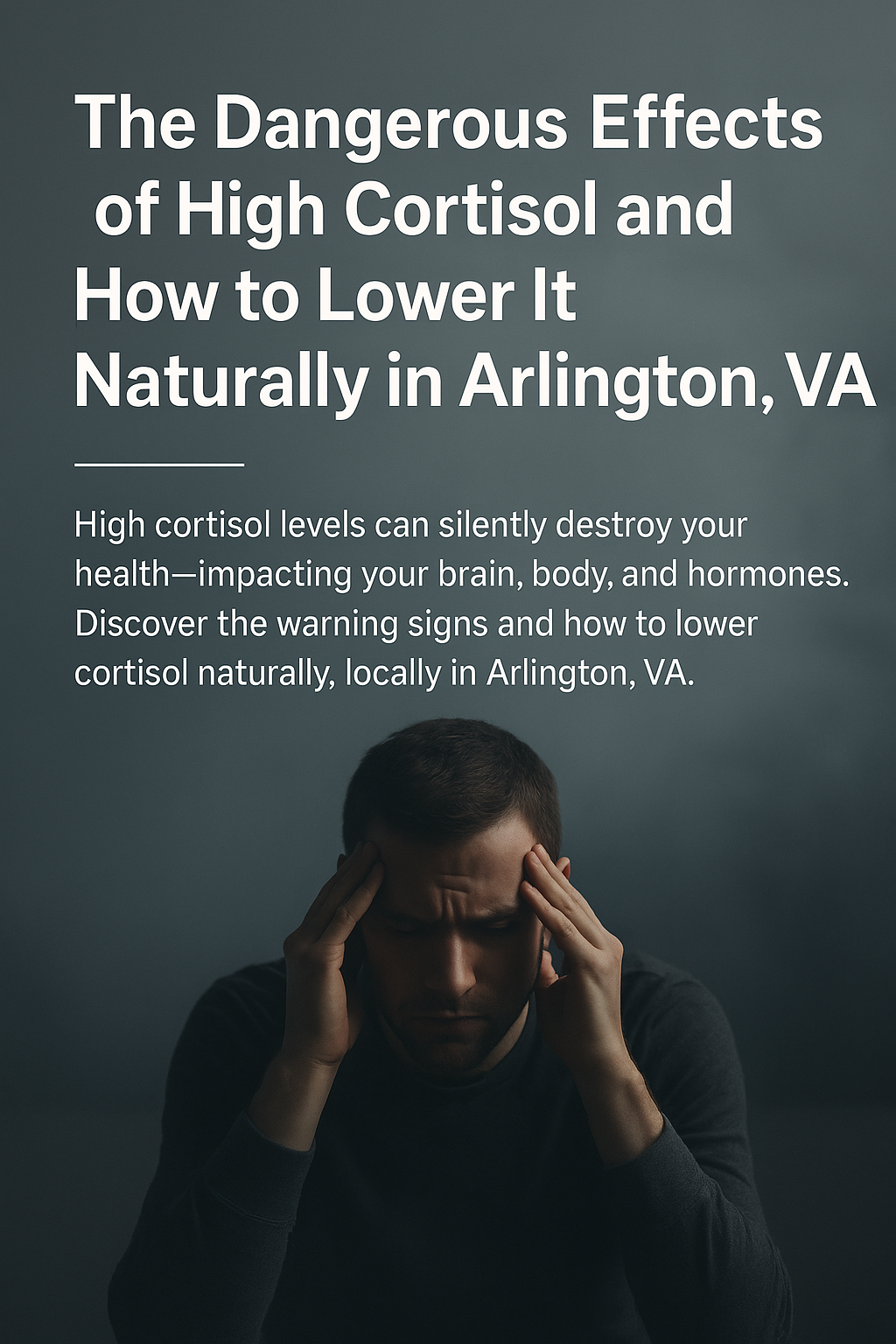The Cortisol Trap: What Chronic Stress Is Really Doing to You
Stress isn’t just mental. It rewires your body. It slowly breaks you down. And for many of our clients here in Arlington, Virginia, the silent culprit behind their exhaustion, weight gain, and brain fog is the same: high cortisol.
This post will walk you through what cortisol is, how it affects your body and brain when it stays elevated too long, and how to lower it—naturally, sustainably, and without guesswork.
Let’s dive in.

Cortisol 101: It’s Not the Villain—Until It Overstays
Cortisol is your primary stress hormone. It gets released when you’re in danger, under pressure, or physically strained. In small doses, it helps you survive. But when cortisol is chronically elevated, it becomes one of the most damaging chemicals in your body.
What High Cortisol Does to Your Brain
Chronically elevated cortisol literally shrinks your brain—especially the hippocampus, which handles memory and learning.
It also impairs the prefrontal cortex (responsible for decision-making) and the amygdala (which regulates fear and emotion).
Over time, this creates:
- Memory loss
- Poor concentration
- Brain fog
- Increased risk of Mild Cognitive Impairment (MCI) and Alzheimer’s disease
As Aviv Clinics explains, this isn’t just theory—it’s visible on brain scans.
What It Does to Your Body
Fat Redistribution & Weight Gain
One of the hallmark signs of cortisol dysregulation is rapid fat gain in the:
- Abdomen
- Face (“moon face”)
- Upper back and neck (“buffalo hump”)
Meanwhile, limbs may appear disproportionately thin—this isn’t normal aging. It’s a sign your stress system is malfunctioning.
Fatigue & Muscle Breakdown
When cortisol stays high, the body breaks down muscle tissue for energy. This leads to:
- Muscle weakness
- Inability to build or maintain muscle
- Severe fatigue—even after rest
Mood & Emotional Stability
You may feel:
- On edge, irritable
- Anxious or depressed
- Mentally “off” or unmotivated
This isn’t just burnout. It’s biology—and it’s reversible with the right approach.
How It Wrecks Hormones and Libido
Cortisol competes with testosterone, estrogen, and DHEA. That means:
- Libido drops
- Erectile dysfunction in men
- Irregular or stopped periods in women
- A complete lack of interest in sex, touch, or intimacy
If you’re not waking up with morning erections anymore, that’s a serious red flag.
👉 Read this: If You’re Not Waking Up With Morning Wood, Your Health Is Screwed
What About the Thyroid?
Many people confuse cortisol symptoms with thyroid issues—and they can overlap. But high cortisol doesn’t “ruin” the thyroid directly. Instead, it creates a hormone imbalance that makes it harder for the thyroid to function optimally.
If you’ve been diagnosed with hypothyroidism or Hashimoto’s and aren’t improving, it’s worth looking at adrenal stress load too. Functional medicine doctors often treat both together.
Common Symptoms of High Cortisol Imbalance
Here’s what we frequently see in clients with dysregulated cortisol:
- Belly fat that won’t budge
- Midday crashes or constant fatigue
- Irritability, anxiety, or sadness
- Cravings for sugar or caffeine
- Waking up at 2–4 AM regularly
- Slow healing, easy bruising, or thinning skin
- Low libido or weak erections
- Memory lapses, forgetfulness, foggy thinking
None of these happen in isolation. They’re part of a system breakdown. But they can be reversed.
How to Lower Cortisol Naturally

The goal isn’t to get rid of cortisol—it’s to restore balance. Here’s how we do that with clients here in Arlington, VA:
💤 1. Prioritize Sleep
- 7–9 hours minimum
- No screens 1 hour before bed
- Magnesium glycinate + blackout curtains
- Sleep and wake at consistent times—even weekends
🧘🏽 2. Downregulate the Nervous System
- Breathwork (box breathing, 4-7-8, etc.)
- Daily walks outdoors
- Morning sunlight exposure
- Journaling or meditation 5–10 minutes daily
🥗 3. Eat Real Food
- Remove seed oils, processed sugar, fried foods
- Eat nose-to-tail: grass-fed beef, bone broth, liver
- Add fermented foods: kimchi, kefir, sauerkraut
- Cortisol-lowering foods: dark chocolate, lentils, green tea, fatty fish
🏋🏽♂️ 4. Train Smart
- Avoid overtraining or daily HIIT
- Strength train 3–4x per week
- Move daily—but prioritize recovery
The Arlington High Cortisol Burnout Pattern
In Arlington, we see the same pattern repeatedly:
High performers (military, federal workers, entrepreneurs, first responders) who look fine on the outside, but are burning out internally.
They’ve done the labs. They’ve tried more caffeine. Some even tried TRT. But no one addressed the root cause—chronic nervous system stress and high cortisol.
If that sounds like you, we’ve built a better way forward.
🧠 This Isn’t Just About Stress—It’s About Strategy.
At Evolve To Fit, we don’t just work with athletes—we work with professionals who demand high performance and longevity.
We combine Gymnastic Strength Training with deep mobility work, nutrition coaching, circadian rhythm restoration, and lifestyle upgrades.
You’ll not only train better—you’ll sleep better, think clearer, and reclaim your edge.
💥 Ready to Fix the Real Problem?
If you’re dealing with cortisol imbalance, you don’t need another supplement or a week off.
You need a strategy that works at the root level—and someone who knows how to guide you through it.
Join our insider list below for free training, cutting-edge guides, and updates that actually move the needle.
✅ External Sources
Healthline – High Cortisol Overview

